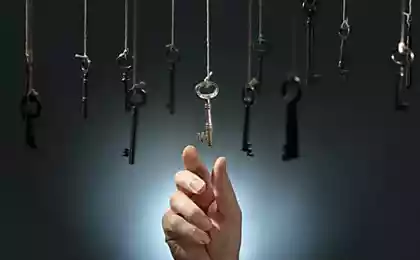196
How and when to use intuition

Little Providence: How and When to Use Intuition
Since childhood, we are taught to make thoughtful and hard-won decisions in the spirit of “measure seven times, cut once.” But experience shows that intuitive insight often yields more impressive results, and long reflection leads to the fact that the convenient moment is missed. Maxim Potashev, Master of the game "What?" Where? When? and an expert from the educational portal BeSmart.net, told where intuitive solutions come from and how to apply them usefully. Anticipate the answer
Scientists from the University of Iowa conducted an experiment. Participants were asked to pull playing cards, some with red shirts and some with blue ones. Depending on the denomination of the card, the person had to receive money or pay money, and the experiment was based on the assumption that cards with red shirts are more risky. So, to understand this and understand the algorithm, you had to look at at least 50 maps. However, the participants of the experiment intuitively leaned to the choice of blue shirts, having already viewed 10-15 cards, not being able to understand and argue.
Nobel Prize-winning physicist Richard Feynman, in his autobiographical book, You’re kidding, Mr. Feynman!, gave several more good examples of how intuition works. For example, in the 1930s, as a schoolboy, he participated in so-called algebraic fights between schools from different cities. The essence of the competition was to quickly solve simple mathematical problems. They could be solved without problems by constructing simple equations. But the allotted time was obviously less than what was required for an honest decision. Therefore, students developed the ability to “see” the answer, find a solution to the problem without solving it. This skill is intuition, and it develops in the most ordinary people. It doesn't need a special gift.
Unconscious experience
Feynman describes his adult experiences. Speaking with Albert Einstein, Feynman presented a particular idea or a physical theory, and he could tell clearly in the middle of the conversation what he was leading to and whether there was a mistake in his reasoning. This magical ability is associated with the experience of thinking about a particular class of problems.
The same thing happens when an experienced doctor at first glance at the patient determines a diagnosis that turns out to be quite accurate. At the same time, if the doctor is asked to tell in detail what observations led him to this diagnosis, then he, of course, will be able to tell, but it will not be easy - at first glance it turns out easier. This effect, which we call intuition, is given by accumulated knowledge and practice in a certain, rather narrow area.
Napoleon Bonaparte is often cited as a brilliant example of intuition. It is not humanly possible to fully comprehend the situation during combat, and many military personnel would agree. Too many people are involved in the processes going on at the same time. Therefore, the great commanders, and particularly Napoleon, have the power of the eye, the ability to look around the battlefield to understand what is happening and make an accurate decision.
A similar skill has football players and basketball players. They see the development of events, looking a little into the future, and can give a pass where the other player should be, judging by how the attack develops. If Napoleon had played basketball, he would not have been able to use his intuitive abilities. A basketball player does not necessarily make a general. So intuition, as we see, is tied to a certain field of activity, and there is no universal intuition.
How to turn on intuition
There are many techniques that are offered to those who wish to develop intuition, but most are mystical in nature. They are based on the idea of reading the signs that our intuition supposedly sends us. But intuition is based on your own life experience and works in the sphere where it is, so mystical approaches to its development lead nowhere.
Usually, management decisions are made this way. The manager is offered a certain amount of information related to the upcoming decision, which he analyzes. Then there is the protection of certain solutions by employees who defend them. Somehow, collectively or individually, decisions are made.
To make a decision intuitively, you need to familiarize yourself with the materials, formulate a question for yourself and immediately choose the answer you like. This should be done before you begin to analyze and voice all the pros and cons in favor of various solutions. The selected option should be written down on a piece of paper and put on the table, and only then start the discussion.
In the future, no one forces you to take out a sheet and voice what is written on it. You can completely forget about it, if in a detailed consideration of the issue there is an option that will be the most profitable, and this will be a clear and logical confirmation. But in a situation where the pros and cons of different options are almost equal, it makes sense to get your intuitive solution out of the drawer and think about why you liked this option and whether it is not worth accepting it as final.
The main thing when using intuition is to hear the inner voice before consciousness turns on and logical reasoning begins. This is not easy, because our logical thinking is trained, developed and there is a constant temptation to turn it on immediately. Using intuition requires self-control: you need to learn to catch the first thought that has arisen, and then calmly think about the task you are facing.
There are two other important points. The first is problem setting. Intuition is a good assistant, but can not solve the problem without your participation. To get an answer to your question, you need to formulate it clearly. The second point is that the subconscious mind does not turn on if you do not have a real inner interest in solving the problem. Intuition only works if the answer is important to you.
Pitfalls
Apply intuition with caution - decisions made on its basis are always unexpected. Interesting military exercises were held in the United States, in which two sides participated. One of the speakers was a group of military, using maximum information and analytical reports from specialists. On the other hand, people with combat experience, who fundamentally refused the services of analysts and at a minimum used data from electronic devices, relying on intuitive solutions. The results showed that the second approach is more effective, in part because the opponent could hardly calculate the actions of the opponent.
An intuitive decision is not always the right one. There is always a risk that it will be wrong and in the future will cost you dearly, so intuition is not used when another option seems logically justified. On the other hand, there are cases when intuition saved more than one life. Pharmaceutical companies, for example, did not put drugs on the market because a top manager was prevented from signing. It seemed that all the documents were in order, but something was confusing, and the person could not even explain what it was. And additional studies showed that the drug was dangerous.
Source: theoryandpractice.ru























